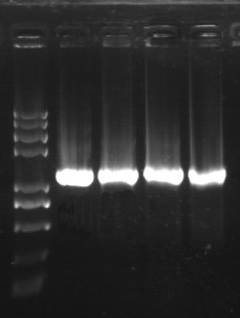
Description:This KOD expressed in E.coli is one of the most efficient thermostable DNA Polymerases with higher accuracy and elongation velocity than any other available DNA polymerase. It exhibits 3’-5’exonuclease (proofreading) activity that enables the polymerase to correct nucleotide incorporation errors. The blunt-ended PCR products are suitable for cloning with any blunt-ended cloning method.
Description
DNA polymerase from Thermococcus kodakaraensis KOD is one of the most efficient thermostable DNA Polymerases with higher accuracy and elongation velocity than any other available DNA polymerase. The KOD DNA Polymerase exhibits 3’-5’ exonuclease (proofreading) activity that enables the polymerase to correct nucleotide incorporation errors. It has no 5’-3’ exonuclease activity. This product is recombinant KOD DNA polymerase expressed in E.coli and purified to homogeneity. The enzyme generates blunt-ended PCR products suitable for cloning with any blunt-ended cloning method.
Package
KOD DNA Polymerase (5U/μl) Cat No. RE-12-003 200 U
10X Buffer 1000 μl
Recommend PCR Protocol
In many cases, the standard reactions described below will provide satisfactory amplification. Remember to include a negative control reaction lacking only template; inclusion of a positive control reaction using a template known to amplify with the primers may also be helpful. Concentrations of enzyme, MgCl2, template and primers can be varied to optimize the reaction..
1、For each 50μl reaction, assemble the following in a 0.5ml PCR tube on ice just prior to use.
| PCR Grade Water | 34.8μl |
| 10×Reaction Buffer | 5μl |
| dNTP Mixture (10mM each, final con. 0.2mM) | 1μl |
| Template DNA(10-500pg) | 1μl |
| 5'-primer (5pmol/μl, final concentration 0.4μM) | 4μl |
| 3'-primer (5pmol/μl, final concentration 0.4μM) | 4μl |
| KOD DNA Polymerase (5 IU/μl) | 0.2μl |
| total volume | 50μl |
The addition of 2-5% DMSO can improve amplification with GC-rich or long templates and will not decrease the fidelity.
2、Mix gently and centrifuge briefly to bring reaction components to the bottom of the tube. If necessary, add mineral oil to cover the reaction, cap the tubes, and place in the thermal cycler.
3、The following are several thermal cycling program options. Note that the choice of primers affects the annealing temperature. In general use an annealing temperature 5°C below the Tm (melting temperature) of the primers as a starting point.
|
Phage and plasmid DNA templates |
Genomic DNA |
cDNA |
||||
|
Target |
1-2 kb |
3-4 kb |
5-6 kb |
7-10 kb |
Up to 2 kb |
Up to 2 kb |
|
Denature |
20’’ 94℃ |
20’’ 94℃ |
20’’ 94℃ |
20’’ 94℃ |
15’’ 95℃ |
20’’ 94℃ |
|
Anneal |
2’’(Tm-5)℃ |
5’’(Tm-5)℃ |
30’’(Tm-5)℃ |
30’’(Tm-5)℃ |
30’’ (Tm-5)℃ |
30’’68℃ |
|
Extend |
20’’72℃ |
40’’72℃ |
1-2’ 72℃ |
4 -5’ 72℃ |
30-60’’ 72℃ |
none |
|
Cycles |
25 |
25-30 |
30 |
30 |
30 |
30 |
4、To analyze the reaction products, remove a 10μl sample from beneath the oil overlay and add to appropriate loading buffer. Load and run an agarose gel containing 0.5μg/ml ethidium bromide and visualize the bands under UV illumination.
Storage
Store at -20°C.


